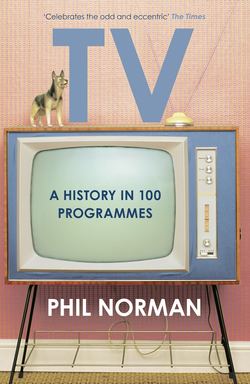Читать книгу A History of Television in 100 Programmes - Steve Berry, Phil Norman - Страница 17
OPPORTUNITY KNOCKS (1956–78) ITV (Associated-Rediffusion/ABC/Thames) The talent show girdles the globe.
ОглавлениеTHE HARD-BITTEN, SELF-MOTIVATING MEN and women who work the reality talent contests would have no need of anything as mimsy as a patron saint, but come the Judgement Day Live Final they’d be granted the protective arm-round-the-shoulder, whether they wanted it or not, of Hughie Green.
A juvenile song-and-dance man turned compère, stunt pilot and international aerospace hardware salesman, Green created radio talent show Opportunity Knocks in 1949 for the BBC Light Programme, though its brash tone proved too gamey for Broadcasting House. Sensing foul play in the cancellation, Green expensively sued the BBC, lost, and took the format to Radio Luxembourg for a two-and-a-half-year stint, before presenting a TV version to Associated-Rediffusion, where he presented a trial run in the summer of 1956, during which time he was declared bankrupt. The motley assortment of talent he initially offered was summed up by Bernard Levin: ‘Nobody on the edition I saw actually made a model of Wembley Stadium out of butter, but there was a man who spent his entire time hopping.’54
The following January, at the height of its Reithian pomp, the BBC broadcast It’s Up To You, a fortnightly talent parade from their northern studio. A panel of judges poured praise and scorn on a line-up of eccentric amateurs including, in the first edition, a man from St Helens who tied his braces round his neck and sported a lemon in his left ear, leaving the panel bewildered. ‘The thing I found distracting about this man,’ complained one judge, ‘was the lemon in his ear.’55
Over on the commercial channel, Hughie was permitted to take show business as seriously as he liked. His contestants were no half-daft party tricks but honest folk with an honest hunger for fame and, on occasion, the talent to honestly acquire it. Success was determined by a postal vote, with a touch of immediacy provided by the mysterious ‘clapometer’, which purported to measure the level of the studio audience’s applause. Green’s default mode of address was a transatlantic unction so treacly its hapless recipients found themselves bogged down to the point of immobility. As one critic remarked, the effect of the Green charm offensive was to leave ‘you feeling – for all the smooth assurances that we were watching new talent get its biggest break – that it was the impresario we were expected to admire’.56 The pattern was set for New Faces and its twenty-first century descendants. Many contestants went on to carve decent careers for themselves (Les Dawson, Pam Ayers, Paul Daniels, Su Pollard, Lena Zavaroni and Freddie Starr among them) but the acts were increasingly a means to an end – that end being the furthering of the talent show brand and those behind it.
A man of colossal ambition, Green found national dominance unsatisfactory. In 1970, after two successful international editions of the show with Norway, Sweden and Denmark joining the UK via crackly satellite feeds, he announced his determination to tackle ‘probably the biggest challenge television light entertainment has had to face’: the creation of a global TV talent show. ‘A communication satellite would mother a world star,’ he predicted, biblically. On New Year’s Eve 1973 he hosted the Opportunity Knocks Concorde Special from the flight deck of the supersonic craft as it zipped over the Bay of Biscay, though the acts themselves were, disappointingly, located in the usual studio.
The following year megalomania set in for keeps, as Green commandeered his own show to deliver an unbalanced anti-union rant, pushing the boundaries of celebrity privilege out of sight. It was only natural that Hughie’s global stardom should peak with ‘a 13,500 mile link-up via the Indian ocean satellite’57 as OppKnox HQ, London joined its newly-created sister franchise at the Channel 7 studios in Sydney, and Hughie’s Aussie counterpart Johnnie Farnham (like Hughie, a former cabaret man with national smash hit ‘Sadie the Cleaning Lady’ under his belt).
With a studio complete with audience and full orchestra apiece, Hughie and Johnnie batted the banter back and forth across the heavenly void, with plenty of well-wrangled applause to cover the time delay. Five previously successful contestants from each country, including Pam Ayers and Frank Carson for the Brits, competed for the special Satellite Trophy. A brave new world beckoned, a globe unified in the name of talent. Nation shall mark spinning plates out of ten unto nation.
Within two years, all the gimmicks used up, Opportunity Knocks came to an end. (A BBC revival in the late ’80s featured Bob Monkhouse as compère and introduced the telephone voting system.) Green didn’t stay down for long, though. He returned in 1980 as ‘adviser’ to London Independent Television, one of the many consortia tendering bids for the 1982 ITV regional franchise renewal. LIT’s typically immodest bid – it was planning to replace both Thames and London Weekend – included Crossroads five days a week, a breakfast programme, Good Morning London, and a familiar-sounding entertainment programme called Talent Scouts, identity of host to be confirmed. Today’s TV talent magnates, powerful as they are, remain little more than tribute acts to the great Hughie.
